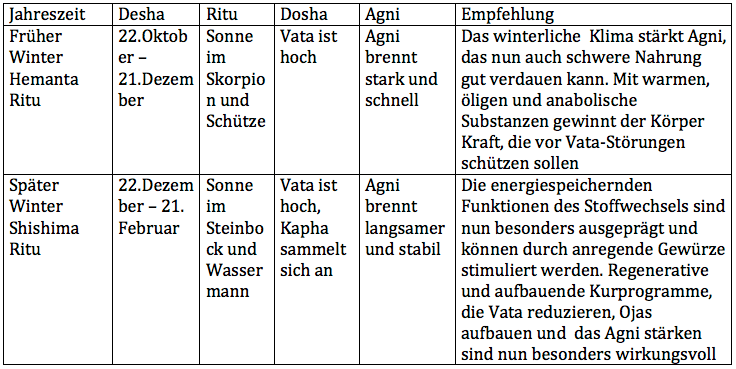These different metabolic qualities should also be taken into account in personal activities and eating habits . The early winter months, for example, are ideal for weight-reducing and performance-enhancing measures. After Christmas at the latest, the body and mind need a break to strengthen health and recharge the batteries.
Performance and immune strength for early winter
The period leading up to the end of the year is often characterized by hustle and bustle and productivity. December is filled with tight deadlines and projects that need to be completed by Christmas. Fortunately, at this time of year our inner biorhythm also provides us with an extremely dynamic force that is driven by a powerful combustion engine. The digestive fire (Agni) ignited by winter Vata increases digestive capacity and enables us to enjoy the many sweet treats and festive menus of the pre-Christmas period in the best possible way. The catabolically burning tissue metabolism also increases physical performance and efficiency.
But be careful - the increased activities of early winter can also increase stress and vata dosha, which leads to an increased susceptibility to colds or flu-like infections. From an Ayurvedic point of view, all warming, restorative and immune-boosting foods and herbs, such as high-quality oils, fermented dairy products, strong broths and hearty stews made from cabbage and root vegetables should be given preference in order to improve the body's own defenses. Those who do not follow a strict vegetarian or vegan diet can also include a little more animal protein in their diet. The moderate consumption of animals from wetlands is expressly recommended in Ayurvedic literature for therapeutic dosha and agni balancing in early winter. In the northern European vegetation zone, this primarily includes poultry such as duck, goose and turkey as well as freshwater fish, which can be eaten in moderate quantities (max. once a week) to strengthen health. If you prefer a vegetarian or vegan diet, you should include enough oils, nuts and protein-rich energy sources such as seitan or tofu in your diet to make it sufficiently heavy and nourishing.
Recharge your batteries in late winter
From the end of December, we begin to hibernate inside and out. Nature quiets down - everything becomes calmer and slower, and our metabolism is also at its peak with its anabolic and energy-storing functions. The body now stores more Kapha, which protects it from cold and emaciation. This also provides the immune system with lasting protection against the Vata factors of the cold, frosty winter weather, which are detrimental to health.
If we want to survive the dark and harsh winter days in good health, we need a calm everyday life adapted to the slower metabolic rhythm with plenty of sleep, relaxation phases and nourishing food that warms, protects and strengthens us. To stimulate inner warmth, circulation and metabolic activity, it is advisable to drink plenty of warm, boiled water or ginger water throughout the day.
Hibernation instead of winter blues
Cold weather, lack of light and little fresh food weaken the body and make the respiratory tract, musculoskeletal system and psyche more susceptible to illness. Almost everyone suffers from a persistent cold or low mood in winter, also known as the winter blues.
The better we manage to keep the seasonal Vata in check, the healthier we feel . Sufficient sleep, exercise in the fresh air, regular oil massages and mentally strengthening food supplements, so-called Medhya Rasayanas - such as Amalaki and Ashwanganda - help as proven remedies against the winter blues.












